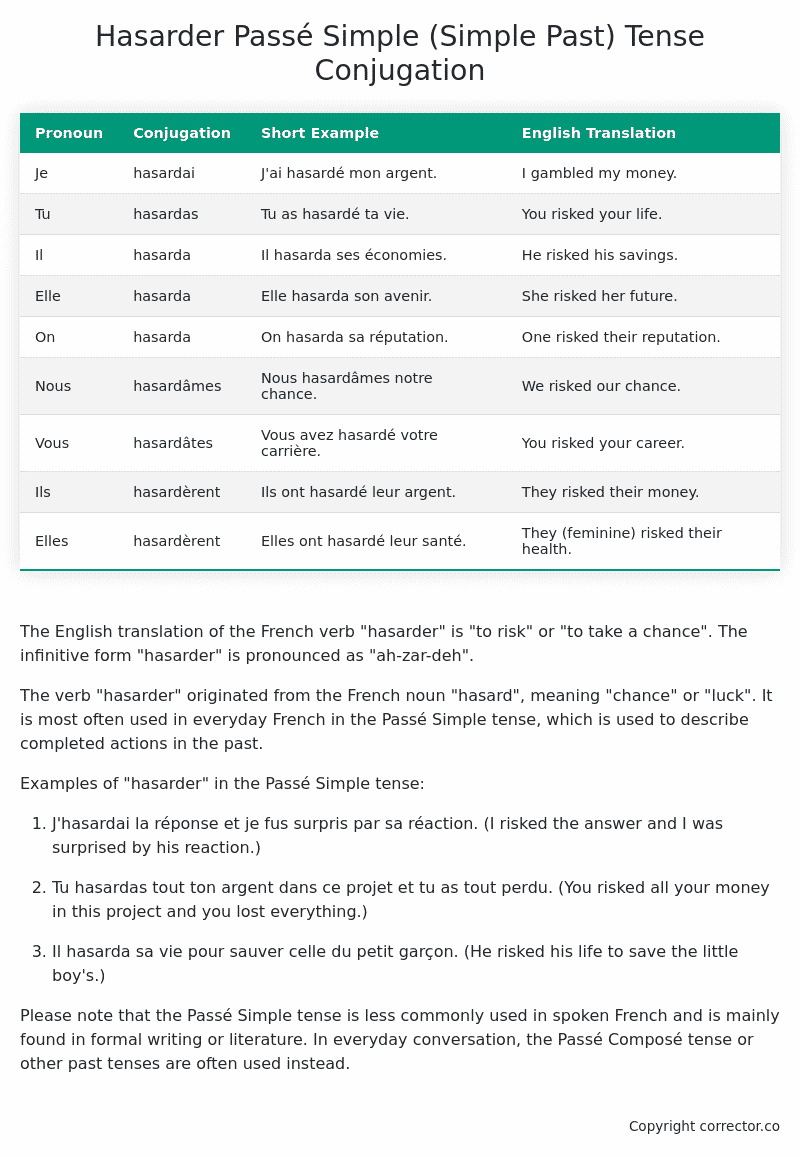Passé Simple (Simple Past) Tense Conjugation of the French Verb hasarder
Introduction to the verb hasarder
The English translation of the French verb “hasarder” is “to risk” or “to take a chance”. The infinitive form “hasarder” is pronounced as “ah-zar-deh”.
The verb “hasarder” originated from the French noun “hasard”, meaning “chance” or “luck”. It is most often used in everyday French in the Passé Simple tense, which is used to describe completed actions in the past.
Examples of “hasarder” in the Passé Simple tense:
-
J’hasardai la réponse et je fus surpris par sa réaction.
(I risked the answer and I was surprised by his reaction.) -
Tu hasardas tout ton argent dans ce projet et tu as tout perdu.
(You risked all your money in this project and you lost everything.) -
Il hasarda sa vie pour sauver celle du petit garçon.
(He risked his life to save the little boy’s.)
Please note that the Passé Simple tense is less commonly used in spoken French and is mainly found in formal writing or literature. In everyday conversation, the Passé Composé tense or other past tenses are often used instead.
Table of the Passé Simple (Simple Past) Tense Conjugation of hasarder
| Pronoun | Conjugation | Short Example | English Translation |
|---|---|---|---|
| Je | hasardai | J’ai hasardé mon argent. | I gambled my money. |
| Tu | hasardas | Tu as hasardé ta vie. | You risked your life. |
| Il | hasarda | Il hasarda ses économies. | He risked his savings. |
| Elle | hasarda | Elle hasarda son avenir. | She risked her future. |
| On | hasarda | On hasarda sa réputation. | One risked their reputation. |
| Nous | hasardâmes | Nous hasardâmes notre chance. | We risked our chance. |
| Vous | hasardâtes | Vous avez hasardé votre carrière. | You risked your career. |
| Ils | hasardèrent | Ils ont hasardé leur argent. | They risked their money. |
| Elles | hasardèrent | Elles ont hasardé leur santé. | They (feminine) risked their health. |
Other Conjugations for Hasarder.
Le Present (Present Tense) Conjugation of the French Verb hasarder
Imparfait (Imperfect) Tense Conjugation of the French Verb hasarder
Passé Simple (Simple Past) Tense Conjugation of the French Verb hasarder (You’re reading it right now!)
Passé Composé (Present Perfect) Tense Conjugation of the French Verb hasarder
Futur Simple (Simple Future) Tense Conjugation of the French Verb hasarder
Futur Proche (Near Future) Tense Conjugation of the French Verb hasarder
Plus-que-parfait (Pluperfect) Tense Conjugation of the French Verb hasarder
Passé Antérieur (Past Anterior) Tense Conjugation of the French Verb hasarder
Futur Antérieur (Future Anterior) Tense Conjugation of the French Verb hasarder
Subjonctif Présent (Subjunctive Present) Tense Conjugation of the French Verb hasarder
Subjonctif Passé (Subjunctive Past) Tense Conjugation of the French Verb hasarder
Subjonctif Imparfait (Subjunctive Imperfect) Tense Conjugation of the French Verb hasarder
Subjonctif Plus-que-parfait (Subjunctive Pluperfect) Tense Conjugation of the French Verb hasarder
Conditionnel Présent (Conditional Present) Tense Conjugation of the French Verb hasarder
Conditionnel Passé (Conditional Past) Tense Conjugation of the French Verb hasarder
Conditionnel Passé II (Conditional Past II) Tense Conjugation of the French Verb hasarder
L’impératif Présent (Imperative Present) Tense Conjugation of the French Verb hasarder
L’impératif Passé (Imperative Past) Tense Conjugation of the French Verb hasarder
L’infinitif Présent (Infinitive Present) Tense Conjugation of the French Verb hasarder
L’infinitif Passé (Infinitive Past) Tense Conjugation of the French Verb hasarder
Le Participe Présent (Present Participle) Tense Conjugation of the French Verb hasarder
Le Participe Passé (Past Participle) Tense Conjugation of the French Verb hasarder
Struggling with French verbs or the language in general? Why not use our free French Grammar Checker – no registration required!
Get a FREE Download Study Sheet of this Conjugation 🔥
Simply right click the image below, click “save image” and get your free reference for the hasarder Passé Simple tense conjugation!

Hasarder – About the French Passé Simple (Simple Past) Tense
Formation
Usage
Narration
Historical Context
Interactions with other tenses
Passé Composé
Imparfait
Conditional and Subjunctive
Summary
I hope you enjoyed this article on the verb hasarder. Still in a learning mood? Check out another TOTALLY random French verb conjugation!


